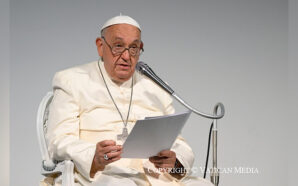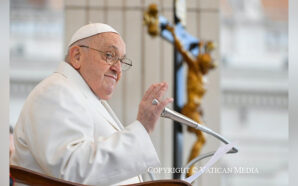As a Lutheran priest, Dietrich Bonhoeffer would frequently offer this advice to a couple when he presided at their wedding: Today you are in love and believe your love will sustain your marriage, but it can’t. Let your marriage sustain your love.
Wise words, but what exactly do they mean? Why can’t love sustain a marriage?
What Bonhoeffer is highlighting is that it is naïve to think that feelings will sustain us in love and commitment over the long haul. They can’t, and they wouldn’t. But ritual can. How? By creating a ritual container that can keep us steady inside the roller coaster of emotions and feelings that will beset us in any long-term relationship.
Simply put, we will never sustain a long-term relationship with another person, with God, with prayer, or in selfless service on the basis of good feelings and positive emotions. This side of eternity, our feelings and emotions mostly come and go according to their own dictates and are not given to consistency.
We know the inconsistency of our emotions. One day we feel affectionate toward someone and the next day we feel irritated. The same is true for prayer. One day we feel warm and focused and the next day we feel bored and distracted.
And so, Bonhoeffer suggests we need to sustain ourselves in love and prayer by ritual, that is, by habitual practices that keep us steady and committed within the flux of feelings and emotions.
For example, take a couple in a marriage. They fall in love and commit themselves to love each other and stay with each other for the rest of their lives, and at root they fully intend that. They respect each other, are good to each other, and would die for each other. However, that’s not always true of their emotions. Some days their emotions seemingly belie their love. They are irritated and angry with each other. Yet, their actions toward each other continue to express love and commitment and not their negative feelings. They ritually kiss each other as they leave the house in the morning with the words, “I love you!” Are those words a lie? Are they simply going through the motions? Or is this real love?
The same holds true for love and commitment inside a family. Imagine a mother and a father with two teenage children, a boy of sixteen and a girl of fourteen. As a family they have a rule that they will sit together at dinner for forty minutes every evening, without their cellphones or other such devices. Many evenings when the son or daughter or one of the parents comes to the table (without their cellphone) out of dram duty, bored, dreading the time together, wanting to be somewhere else. But they come because they have made that commitment. Are they simply going through the motions or showing real love?
If Bonhoeffer is right, and I submit he is, they are not just going through the motions, they are expressing mature love. It’s easy to express love and be committed when our feelings are taking us there and holding us there. But those good feelings will not sustain our love and commitment in the long-term. Only fidelity to a commitment and ritual actions that undergird that commitment will keep us from walking away when the good feelings go away.
In our culture today, at most every level, this is not understood. From the person caught up in a culture addicted to feelings, to a good number of therapists, ministers of religion, prayer leaders, spiritual directors, and friends of Job, we hear the line: If you aren’t feeling it, it’s not real; you’re just going through the motions! That’s empty ritual!
Indeed, it can be an empty ritual. As scripture says, we can honor with our lips even as our hearts are far away. However, more often than not it is a mature expression of love because it is now a love that is no longer fueled by self-interest and good feelings. It’s now a love that’s wise and mature enough to account for the human condition in all its inadequacy and complexity and how these color and complicate everything – including the one we love, our own selves, and the reality of human love itself. The book we need on love will not be written by passionate lovers on their honeymoon, just as the book we need on prayer will not be written by a religious neophyte caught up in the first fervor of prayer (nor by most enthusiastic leaders of prayer). The book we need on love will be written by a married couple who, through ritual, have sustained a commitment through the ups and downs of many years. Just as the book we need on prayer will be written by someone who has sustained a life of prayer and church going through seasons and Sundays when sometimes the last thing he or she wanted to do was to pray or go to church.
Used with permission of the author, Missionary Oblates of Mary Immaculate Fr Ron Rolheiser OMI. Fr Rolheiser is a faculty member of the Oblate School of Theology in San Antonio, Texas. He can be contacted through his website, www.ronrolheiser.com and on Facebook www.facebook.com/ronrolheiser








